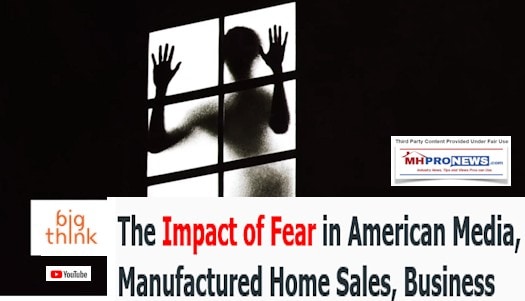
In “The Science of Fear-Mongering: How to Protect Your Mind from Demagogues,” Harvard psychologist Susan David explains “the dangers of fear-mongering, the questionable ethics of journalism in spreading hate politics, and the disturbing way that repetition wears down our brain’s resistance to fallacies and hate speech,” per Big Think’s YouTube post.
David notes that feelings of safety, right, comfort – their opposites – along with the role that repetition plays, are all part of the “the science of fear mongering.”
What has arguably gone under-explored in the manufactured housing industry is the role that fear plays with:
- Prospective buyers,
- public officials (think, zoning – votes),
- investors, business people (being in – or not in – ‘the group,’
- media,
- educators,
- industry members themselves – what causes you or others to think and behave as you do,
plus all others.

Susan David’s Video
David’s 8-minute video has a left-of-center slant that would be common among many in Harvard. With that caveat and bias in mind, she nevertheless makes important points for manufactured housing professionals to consider.
How is feared used to condition people, for-or-against something?
What role does propaganda play in fear?
Benson Demonstrates How “Propaganda Works” on “Most Americans”
Customers are often driven by a variety of fears.
For instance in sales, there’s the notion of the ‘fear of loss’ – rising interest rates, pricing, a closeout model, or that perfect vacant home-site are but some examples – that have often been used as a real or imagined pressure point to ‘close the deal.’
But among customers, there are other fears.
What about fear caused by the economy? Or how fear of “X” – fill in the blank for x – affect my job? Will there be a war with North Korea, Red China, or Russia? Will terrorists strike?
Then there are also fears caused by social pressures, or safety concerns.
Those kinds of powerful emotional drivers are reasons why videos and articles can be useful in helping a customer overcome a false fear. Facts – properly understood – can overcome fear. An example from MHLivingNews.com is posted below. But there are hundreds of others that address specific issues, often from the vantage point of the home owner or an expert.
Hurricane Irma Florida Survivor Relates First-Hand Manufactured Home Safety, Durability Experience – manufacturedhomelivingnews.com
Americans watched, listened, and millions anxiously awaited news last month about just how deadly and destructive Hurricane Irma would be. But John Jenkins, featured in the first video below, live through it. Jenkins weathered the storm in his home, and can now tell his dramatic story.
David’s point is one that impacts investors, and all professionals.

Fear can cause people to do – or not do – something that their normal value system would cause them to be inclined to do. Pollsters, for example, recognized that a percentage of “the Trump voters” would not always say what they believed. Isn’t that a social acceptance fear at work?
Is fear manifest in other ways within the manufactured housing industry? Isn’t the only answer, yes?
David asks, “How do we thrive in a world where every which way we turn our fear is being activated by politicians, by the media and by the desperate events that are happening around us?”
Spotting fear, and recognizing techniques of manipulation are perhaps as or more important today than in years gone by.
Why? Because when people are ‘busy,’ they often default into patterns – instead of questioning, based upon evidence, those patterns and beliefs.
“What is really fascinating when we look at the brain research around fear is that our brains proxy anything that feels unfamiliar, incoherent or inaccessible as being unsafe,” says David.
“There is fascinating research that shows that when people have lower levels of self-esteem and they are in a job in which they are recognized and promoted, that promotion can feel incoherent to the person with low self-esteem. They have low self-esteem and they might be used to and expecting to be treated badly. So what is fascinating is the results showing that when people are promoted when they have a lower levels of self-esteem they are more likely to leave their jobs,” the psychologist explains.
“Fear is an incredibly, incredibly powerful force in our lives and our brains are fairly immature in assessing anything that feels slightly incoherent for unfamiliar as unsafe. What this might mean is that if you are used to hearing a story time and time again from a parent or from a partner about how you are not good enough, you are more likely to be drawn to that relationship because it feels familiar,” she says.
David adds that, “Fear has always had a hold on us, but never with such fervor.”
Media savvy professionals recognize that fear must be overcome.
But how often do professionals consider that habit combined with fear can be coercive?
What are the ways that fear and manipulation tactics may be used against you, your customers, or others that you know? “We Provide, You Decide.” © ## (News, analysis, and commentary.)
Note 1: Stay in the know! Thousands of MH Pros, Investors, Officials and Housing Experts do it. You, your team, and industry colleagues can sign up to the MH Industry leading headline news/updates – typically sent twice weekly – click here to sign up in just seconds.

